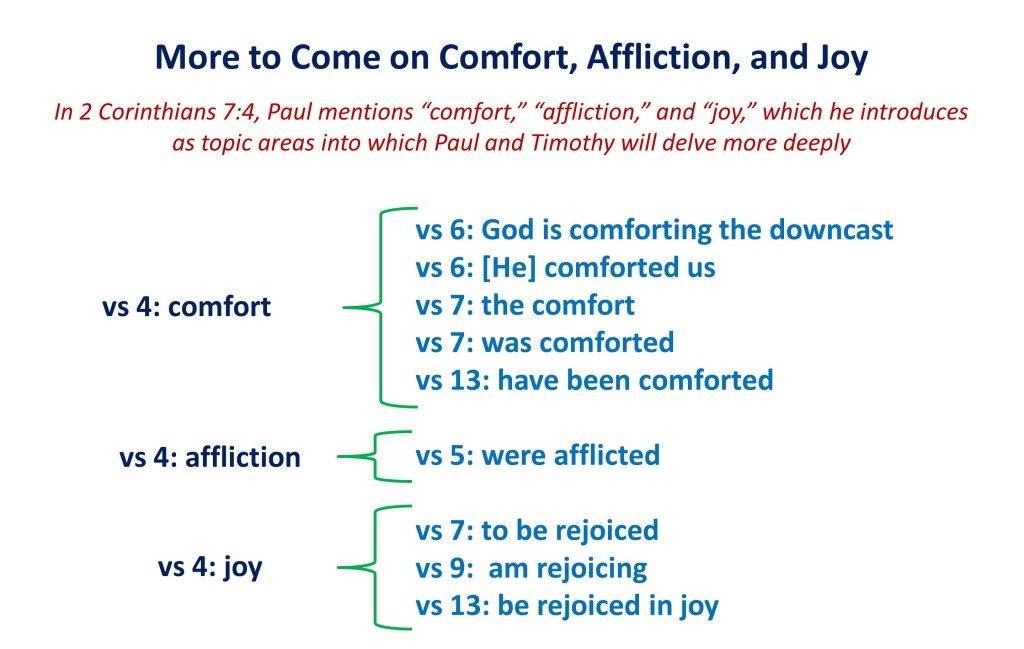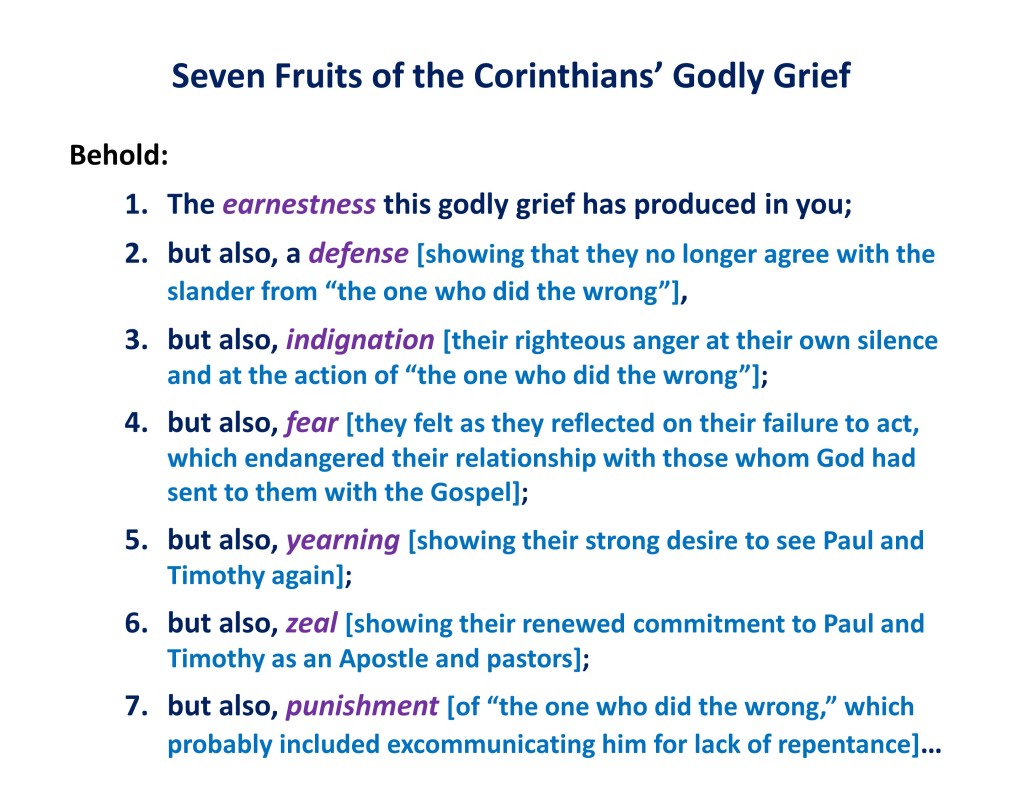 Last week, we saw Paul and Timothy command the Corinthians using three different voices:
Last week, we saw Paul and Timothy command the Corinthians using three different voices:
- Active voice: Come away from the false teachers [You must do this] (6:17a)
- Passive voice: Be separated from them [but you don’t have the power to do this] (6:17b)
- Middle voice: don’t touch what is unclean [the false teachers; this applies to you, not someone else] (6:17c)
Although the Corinthian Christians don’t have the power on their own to do this, God does (6:18). So, the solution to this dilemma is to be where God comes to them in His power to do what they are powerless to do themselves. Where that is, is with the “we”: Paul and Timothy: “We have these promises” (7:1).
Because Paul and Timothy are not false teachers and have “these promises,” we now learn what this means.
Make Room for Life, not Death
Read 2 Corinthians 7:2
“Make room”: A command. It’s not “make room for us in your heart” but “make room for us.” Here we find an example of “wordplay” (paronomasia). “Make room” (chorosate) has the same Greek root as the “you are constricted” (stenochoreisthe), which earlier described the Corinthians’ attitude toward Paul and Timothy (See 2 Corinthians 6:12).
- How are the Corinthians to “make room for Paul and Timothy”?
- In today’s context, how do Christians “make room” for a pastor who is not a false teacher?
- Unlike the false teachers, what have Paul and Timothy not done?
Read 2 Corinthians 7:3
- Who now becomes the subject in this verse? What does this show?
- What is Paul not doing when he writes what he writes?
2 Corinthians 7:4
- Instead of condemning the Corinthians Christians, how does Paul feel toward them in four specific ways?
Comforted by Titus
Read 2 Corinthians 7:5-7
- What was Paul and Timothy’s situation when they arrived in Macedonia?
- How did God comfort Paul and Timothy?
- In what three specific areas did the Corinthians relay their attitude about Paul and Timothy?
How to make sense of this: The Corinthian Congregation was most likely a congregation that:
- Had mixed feelings toward Paul and Timothy, which would cause them to vacillate regarding them (in relation to the false, Jewish teachers). In this verse, we hear of their positive feelings
- Was split. Some preferred the Apostle Paul and Pastor Timothy, other preferred the false teachers who came with letters of recommendation
Godly Grief
2 Corinthians now switches to “I.” Paul is taking personal responsibility for the letter that he earlier written to Corinthians, which caused them “grief.” He now specifically focuses on that earlier letter and how the Corinthians responded to it. Remember that 2 Corinthians was the 4th letter to the Corinthian congregation, two of which have been lost. The grief-causing letter was the third, delivered to the Corinthians between 1 Corinthians and 2 Corinthians.
Read 2 Corinthians 7:8-9
- Paul seems “all over the map.” Why does he regret his earlier letter and why doesn’t he?
Read 2 Corinthians 7:10
- What is the difference between “godly grief” and “worldly grief”?
Read 2 Corinthians 7:11-13a
Paul now lists the fruits produced by the Corinthians’ “godly grief.” He lists seven attitudes and actions that show the genuineness of their repentance. This repentance deals specifically with the Corinthians’ earlier silence about “the one who did the wrong” (vs. 12) regarding Paul’s earlier letter (vs. 8).
In verse 12, Paul puts the offending letter he wrote in his current context.
- Why did Paul not write that letter and why did he?
- What was the result of the Corinthians’ eagerness for Paul and Timothy being revealed?
Joy on Top of Joy
Read 2 Corinthians 7:13b-14
- Why was Titus’ spirit refreshed by the Corinthians?
- This led to more of what for Paul and Timothy?
Excursus: The Concept of “Shame”
The Greek New Testament has more than one word for “shame.” Here, 2 Corinthians uses kataisxuno.
kataisxuno: This means to be dishonored, put to shame, or disappointed. Within the intellectual, philosophical side of Greek culture, being shown to be wrong brought with it a sense of shame. (You’re not who you claim to be; you don’t know what you claim to know.) We see that usage here in 2 Corinthians 7:14. Paul said that, because what he had earlier said about the Corinthians proved to be true, he was “not put to shame.” Paul was not shown to be wrong, which included its associated shame.
entrepo: This is another word for “shame.” Its range of meanings includes “to be ashamed” and “to turn about.” These two meanings seem unrelated, until we see the tie-in with the intellectual side of Greek culture: being shown to be wrong can be “shameful” but it can also “turn about” someone’s view.
The idea of shame does include shame, but is also includes what is at the root of such shame. Even more, the result of such shame is not to be in “shame” but to move or be brought into something else, which entrepo helps show us.
In our culture, we do not experience much shame. When we do, it is often associated with intense, public embarrassment. And so our idea of shame fixates on the shame itself, and sees little beyond it.
What does this mean to us as students of Scripture? If we bring our cultural baggage that comes with “shame” and transfer that into the New-Testament text, we get a skewed understanding of what the biblical write meant by “shame.”
———
Read 2 Corinthians 7:15-16
“fear and trembling”: A biblical expression often used to refer to people being in the presence of God (see Exodus 15:16, Isaiah 19:16, and Philippians 2:12). Paul takes this phrase to describe a tense situation (In 1 Corinthians 2:3, Paul described himself being in “fear and trembling”). The situation at Corinth must have been tense, with not only Titus on edge but also the Corinthians. But they remained loyal, that is obedient, to God’s “ambassadoring ones”: Paul and Timothy.
- As Paul ends this section, what is his assessment of the Corinthians?
Click here to go to the next Lesson.





